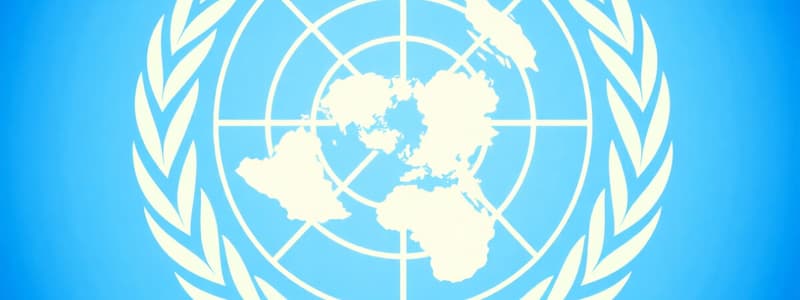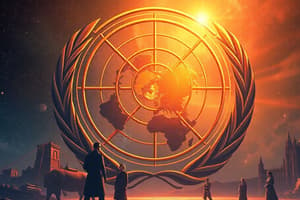Podcast
Questions and Answers
Which of the following organs of the UN is responsible for overseeing the coordination of subsidiary organs?
Which of the following organs of the UN is responsible for overseeing the coordination of subsidiary organs?
- General Assembly (correct)
- Human Rights Council
- Economic and Social Council (ECOSOC)
- International Law Commission
The International Court of Justice (ICJ) has the power of judicial review over UN acts.
The International Court of Justice (ICJ) has the power of judicial review over UN acts.
False (B)
What major function does the Human Rights Council perform regarding member states?
What major function does the Human Rights Council perform regarding member states?
Universal Periodic Review (UPR) of human rights situation
The UN ______ Council was established to oversee territories that were not self-governing.
The UN ______ Council was established to oversee territories that were not self-governing.
Match the following UN bodies with their primary functions:
Match the following UN bodies with their primary functions:
What is the current number of staff in the Secretariat of the UN?
What is the current number of staff in the Secretariat of the UN?
The Secretary-General of the UN is responsible for the day-to-day running of the organization.
The Secretary-General of the UN is responsible for the day-to-day running of the organization.
Who is the current Secretary-General of the UN?
Who is the current Secretary-General of the UN?
The Security Council has primary responsibility for maintenance of international __________.
The Security Council has primary responsibility for maintenance of international __________.
What is required for the Security Council to determine an 'important question'?
What is required for the Security Council to determine an 'important question'?
Match the following UN bodies with their primary focus:
Match the following UN bodies with their primary focus:
Resolutions passed by the General Assembly are binding on UN Member States.
Resolutions passed by the General Assembly are binding on UN Member States.
What article outlines the decision-making process for 'other questions' in the UN?
What article outlines the decision-making process for 'other questions' in the UN?
How many permanent members are in the UN Security Council?
How many permanent members are in the UN Security Council?
The Trusteeship Council is currently active and functioning.
The Trusteeship Council is currently active and functioning.
What is the role of the Economic and Social Council (ECOSOC)?
What is the role of the Economic and Social Council (ECOSOC)?
Decisions in the UN Security Council require a __________ majority for procedural matters.
Decisions in the UN Security Council require a __________ majority for procedural matters.
Match the following UN bodies with their primary functions:
Match the following UN bodies with their primary functions:
What voting requirement exists for 'all other matters' in the UN Security Council?
What voting requirement exists for 'all other matters' in the UN Security Council?
The International Court of Justice's decisions are not binding on states.
The International Court of Justice's decisions are not binding on states.
How many judges are there in the International Court of Justice?
How many judges are there in the International Court of Justice?
Study Notes
Secretariat
- Located in the United Nations Headquarters in New York City
- Responsible for the day-to-day running of the UN
- Staff are independent from the Member States
- Headed by the Secretary General who is the UN's chief administrative officer
General Assembly
- Composed of all UN member states
- Decides on important questions using a two-thirds majority
- Decides on other questions using a simple majority
- Resolutions are not legally binding on member states unless they are adopted under Chapter VII of the Charter.
Security Council
- Has primary responsibility for the maintenance of international peace and security
- Has 15 members:
- 5 permanent members (P5): China, France, Russia, the United Kingdom, and the United States
- 10 non-permanent members elected by the General Assembly for two-year terms
- Decisions are made by resolutions which are binding on all UN member states
- Each member has one vote and procedural matters require a simple majority (9 out of 15 members)
- Substantive matters require a nine-vote majority, including the affirmative votes of all five permanent members
- A permanent member can use a veto to prevent the adoption of a resolution.
Economic and Social Council (ECOSOC)
- Coordinates the work of the UN specialized agencies
- Focuses on economic and social development and cooperation
Trusteeship Council
- Was designed to assist and administer territories until their independence
- No longer active
International Court of Justice (ICJ)
- The main judicial organ of the UN
- Consists of 15 judges elected by the General Assembly and the Security Council
- Has two main functions:
- Adjudicate contentious cases between states
- Issue advisory opinions
- Decisions in contentious cases are binding on the states involved
- Advisory opinions are not binding
- The ICJ has a special role in enforcing its decisions
- UN Member states are obligated to comply with ICJ rulings.
- If a state refuses to comply, Article 94(2) of the UN Charter allows the Security Council to recommend measures to be taken against the non-compliant state.
Subsidiary Organs
- The subsidiary organs of the UN are created by the principal organs of the UN
- Examples:
- International Law Commission (ILC)
- Human Rights Council (HRC)
- Subsidiary organs do not have final responsibility over any UN matter
- Their budgets are generally included in the regular UN budget.
Studying That Suits You
Use AI to generate personalized quizzes and flashcards to suit your learning preferences.
Related Documents
Description
Test your knowledge on the key components of the United Nations, including the Secretariat, General Assembly, and Security Council. This quiz covers their responsibilities, decision-making processes, and membership structure. Challenge yourself to understand how these entities work together to maintain international peace and security.




